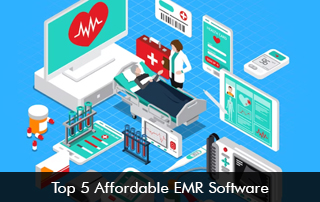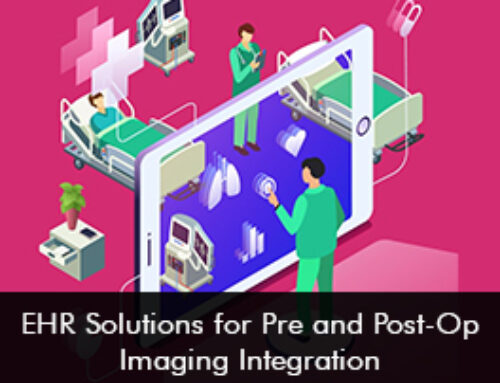Electronic Medical Record (EMR) software is an essential tool for healthcare practices. From small clinics to large hospitals, everyone is looking for affordable EMR software. In this blog, we’ll explore five affordable EMR software solutions available in the US market, offering cost-effective options without compromising on functionality and compliance.
Top 5 Affordable EMR Software
1. Kareo EMR Software
Kareo is a cloud-based EMR and medical billing software designed for small to mid-sized medical practices. It’s known for its user-friendly interface and affordability. Kareo offers a range of features, including appointment scheduling, charting, e-prescribing, and billing.
Pricing: Kareo offers transparent pricing with a monthly subscription model. Pricing starts at around $160 per provider per month for EMR and medical billing services, making it an attractive option for small practices looking to manage both clinical and financial aspects efficiently.
Key Features:
- User-friendly interface.
- Mobile access for providers.
- E-prescribing and lab integration.
- Billing and revenue cycle management.
- Patient portal for communication and appointments.
2. Practice Fusion for Affordable EMR Software
Practice Fusion is a cloud-based EMR software solution that offers a free, ad-supported version, making it one of the most budget-friendly options for small healthcare practices. It’s suitable for independent physicians, nurse practitioners, and small clinics.
Pricing: The free version of Practice Fusion is supported by ads, while a subscription-based model is available for those who prefer an ad-free experience. Prices start at around $149 per provider per month for the ad-free version, which includes e-prescribing, lab integration, and charting capabilities.
Key Features:
- Free version with ad support.
- Customizable templates.
- E-prescribing and lab integrations.
- Patient portal for secure communication.
- Appointment scheduling and billing options.
3. Athenahealth EMR Software
Athenahealth is a cloud-based healthcare management platform that offers an integrated suite of services, including EMR, medical billing, and practice management. It caters to practices of all sizes, from solo practitioners to large healthcare organizations.
Pricing: Athenahealth does not openly disclose its pricing, and costs may vary based on the size and specific needs of your practice. However, it is known for its transparent pricing structure, with subscription-based options that can be tailored to your requirements.
Key Features:
- Integrated EMR and practice management.
- Revenue cycle management services.
- E-prescribing and lab integrations.
- Population health management tools.
- Robust reporting and analytics.
4. DrChrono EHR Software
DrChrono is a mobile-friendly EMR and practice management platform suitable for practices of all sizes, including solo practitioners, group practices, and specialty clinics. It offers a range of features to streamline clinical workflows and improve patient engagement.
Pricing: DrChrono offers transparent pricing with a variety of subscription plans. Pricing starts at around $199 per provider per month for the Basic plan, which includes EMR and medical billing features. Special rates may be available for smaller practices.
Key Features:
- Mobile EMR access.
- Customizable templates.
- E-prescribing and lab integrations.
- Patient check-in and kiosk features.
- Revenue cycle management services.
5. OpenEMR an Affordable EMR Software Option
OpenEMR stands out as an open-source EMR software solution, which means it’s free to use, making it highly affordable for budget-conscious practices. It offers a range of features and can be customized to fit the needs of different medical specialties.
Pricing: OpenEMR is an open-source platform, and its core features are entirely free. However, users may need to budget for IT support, customization, and hosting, depending on their specific requirements. These costs can vary widely but are generally lower than subscription-based EMR software.
Key Features:
- Open-source and highly customizable.
- E-prescribing and lab integrations.
- Customizable templates and forms.
- Patient portal for secure communication.
- Extensive community support.
Factors to Consider When Choosing Affordable EMR Software
While affordability is a significant factor when selecting EMR software, it’s essential to consider other factors to ensure that the chosen solution meets your practice’s specific needs:
1. Usability: An EMR system should be user-friendly and fit seamlessly into your practice’s workflows. Consider how intuitive the software is for providers and staff.
2. Compliance: Ensure that the EMR software complies with relevant healthcare regulations, such as HIPAA, to safeguard patient data and privacy.
3. Customization: Evaluate the software’s ability to adapt to your practice’s unique requirements. Customizable templates and forms can help streamline documentation.
4. Integration: Check if the EMR software integrates with other systems you use, such as e-prescribing, lab systems, and billing software, to ensure data flows smoothly.
5. Support and Training: Consider the availability of customer support, training options, and resources to assist with onboarding and ongoing use.
6. Scalability: Assess whether the software can accommodate your practice’s growth and evolving needs in the future.
7. Patient Engagement: Look for features like patient portals that facilitate secure communication, appointment scheduling, and access to medical records.
8. Reporting and Analytics: Evaluate the software’s reporting capabilities, as data analytics can provide insights to enhance patient care and practice efficiency.







